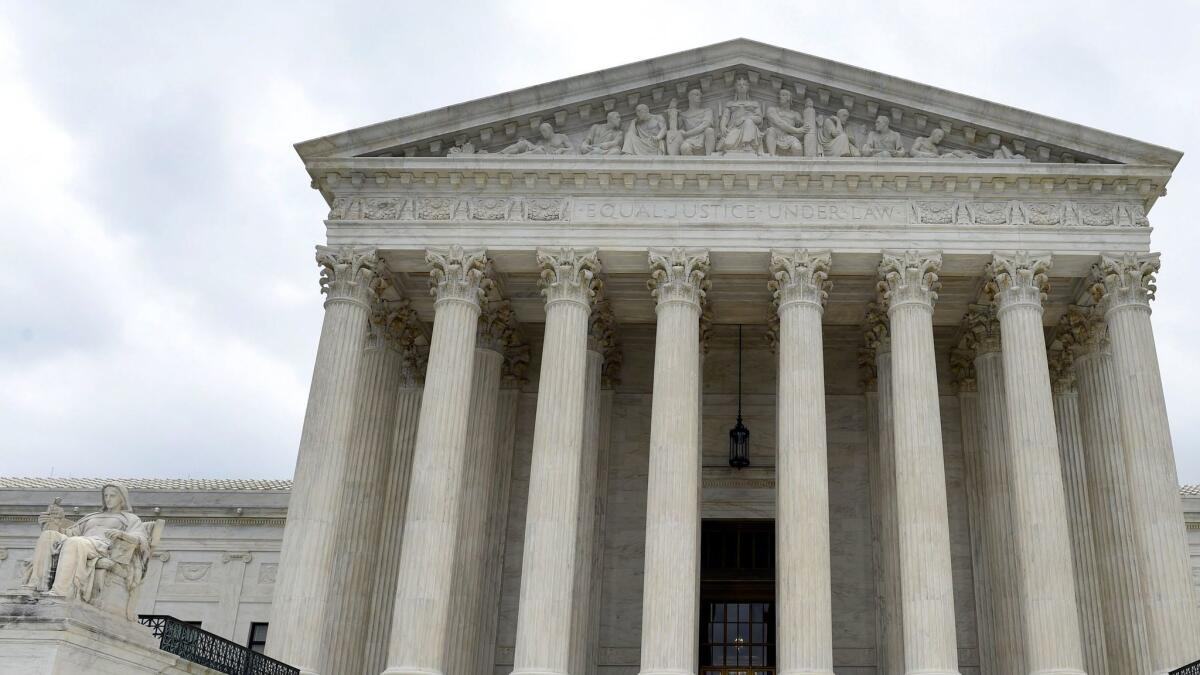Supreme Court justices skeptical of deportation order against Bay Area burglar

- Share via
Reporting from Washington — The Supreme Court, hearing arguments Tuesday in a California deportation case, signaled it may make it harder for the government to forcibly remove legal immigrants with certain kinds of crimes on their record.
The case involves a native Filipino and longtime legal resident of the Bay Area who was convicted of breaking into a garage and an empty house in separate incidents.
At issue is whether crimes such as home burglary, fleeing from the police, money laundering or child abuse can be considered “crimes of violence” that trigger mandatory deportation under federal law.
The ruling could set new rules for the Trump administration if it seeks to forcibly remove legal immigrants who have criminal records.
James Garcia Dimaya was charged with residential burglary under California law and served more than five years in prison. U.S. immigration officials said those crimes were enough to trigger his deportation under the law.
But in their questions, the justices cast doubt on whether his crimes were properly classified as “aggravated felonies.”
If they conclude they were not, their ruling could complicate efforts by the Trump administration to speed up deportations. President-elect Donald Trump has pledged to accelerate the deportation of immigrants here illegally who have been accused or convicted of crimes.
The law in this area is not entirely clear. Beginning in 1988, Congress ordered deportation for noncitizens who are convicted of an “aggravated felony,” and it cited specific examples such as murder and rape. Later the law was expanded to include a general category of “crimes of violence.” This was defined to include offenses that involve a use of physical force or a “substantial risk” that force would be used.
Judges have been divided as to what crimes call for deportation. Looming over Tuesday’s argument was an opinion written two years ago by the late Justice Antonin Scalia. He spoke for an 8-to-1 majority in striking down part of a federal law known as the Armed Career Criminal Act. It called for extra years in prison for people convicted of more than one violent felony.
In that case, the extra prison term was triggered by the defendant’s possession of a shotgun. In frustration, Scalia and his colleagues said the law was unconstitutionally vague because they could not decide whether gun possession is itself evidence of a violent crime.
“You could say the exact same thing about burglary,” Justice Elena Kagan said Tuesday. A midday burglary of a home could result in violence, she said, but perhaps not if it were an empty garage or an abandoned house. “So it seems like we’re replicating the same kind of confusion,” she said.
Justice Stephen G. Breyer said judges have no way to decide which crimes typically or usually involve violence. “We’re just left guessing,” he said, suggesting a better approach would be “look at what the person did.”
But Deputy Solicitor Gen. Edwin Kneedler said a home burglary poses a risk of violence. And he said the court should defer to the government on matters of immigration. The law, he said, calls for a “broad delegation” of authority to executive officials.
This is the argument government lawyers made in defense of President Obama’s use of executive authority to try to shield millions of immigrants from deportation. It is also the argument that would call for upholding an aggressive deportation policy if pursued by the Trump administration.
In their legal briefs, government lawyers said a ruling in favor of Dimaya, the Philippine burglar, could have a domino effect and prompt judges to block deportations that were triggered by a host of other crimes.
Dimaya was born in the Philippines and came to the United States in 1992, when he was 13 years old. He went to high school, became a lawful permanent resident and settled in Hayward.
He was convicted and sent to state prison for the burglaries of a garage in 2007 and an empty house in 2009.
Immigration judges agreed with deporting Dimaya because his burglary convictions were “crimes of violence” that qualified as “aggravated felonies.”
But the 9th Circuit Court of Appeals disagreed in a 2-1 ruling and said this provision was unconstitutionally vague. Judge Stephen Reinhardt in Los Angeles cited Scalia’s opinion and said the immigration law had the same flaw as the Armed Career Criminal Act. Judge Kim McLane Wardlaw agreed to form the majority, while Judge Consuelo Callahan dissented.
The 7th Circuit Court in Chicago handed down a similar ruling, while the 5th Circuit in New Orleans ruled in favor of the government.
The split prompted the high court to decide the case of Lynch vs. Dimaya. By the time the decision is handed down, the case will probably be relabeled Sessions vs. Dimaya, to reflect expected change of attorney general.
Still pending before the court is a class-action suit from Los Angeles challenging whether immigrants facing possible deportation may be arrested and jailed for more than six months without a bail hearing.
Trump’s victory assures a conservative majority on the Supreme Court. »
For the 4th time, the Electoral College picks the loser of the popular vote. »
On Twitter: DavidGSavage
ALSO:
Can Trump put another Justice Scalia on the Supreme Court?
UPDATES:
3:20 p.m.: The article was updated after arguments.
The article was originally published at 6:15 a.m.
More to Read
Get the L.A. Times Politics newsletter
Deeply reported insights into legislation, politics and policy from Sacramento, Washington and beyond. In your inbox three times per week.
You may occasionally receive promotional content from the Los Angeles Times.











